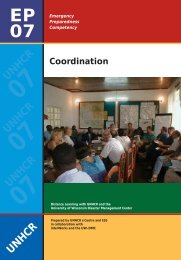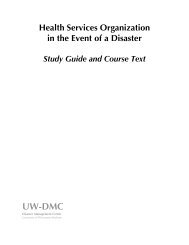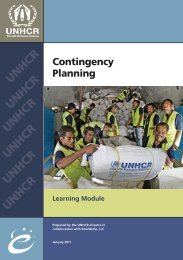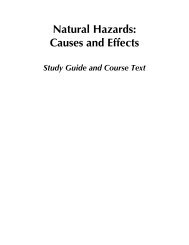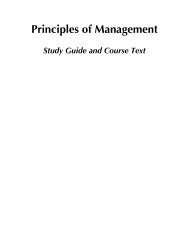Managing External Relations - Disaster Management Center ...
Managing External Relations - Disaster Management Center ...
Managing External Relations - Disaster Management Center ...
You also want an ePaper? Increase the reach of your titles
YUMPU automatically turns print PDFs into web optimized ePapers that Google loves.
Welcome and Introduction<br />
Welcome to to this self-study course on <strong>External</strong> <strong>Relations</strong> (EP-04). This self-study course will<br />
provide you with useful information and techniques to improve your ability to manage external<br />
relations before and during a refugee emergency.<br />
Link to UNHCR’s Career <strong>Management</strong> System<br />
This course supports UNHCR’s Career <strong>Management</strong> System (CMS) competency, ‘<strong>External</strong><br />
<strong>Relations</strong>.’ This competency, required for emergency preparedness, is coded as EP04 within<br />
the UNHCR competency catalogue system. The competency description from the catalogue is<br />
reproduced below:<br />
The Emergency Preparedness and Response competency (EP04) consists of the ability to<br />
identify a network of relevant contacts and to build and maintain constructive relations,<br />
in order to further UNHCR’s objectives in innovative and creative ways that are also<br />
sensitive to the political and social environment.<br />
To demonstrate competency in the area of managing external relations, the emergency<br />
manager must be able to:<br />
1. Identify and establish a network of useful contacts from other groups or<br />
nstitutions (such as government authorities, implementing partners, and<br />
UN agencies); foster co-operation and trust with contacts in the network;<br />
provide advice and information regarding UNHCR activities; consider the<br />
concerns and information needs of these groups or institutions.<br />
2. Encourage government officials to accept responsibility for refugee issues<br />
through presentation of well-justified arguments.<br />
3. Maintain productive relationships with donors by demonstrating to them<br />
the practical usage of funds through reports or missions to observe UNHCR<br />
programs and actively involve donors in fundraising activities.<br />
4. Maintain positive relations with the media, seeking to put forward UNHCR’s<br />
view in a positive manner; avoid direct, public confrontation with governments<br />
and other bodies.<br />
5. Seek to resolve any significant problems impacting UNHCR’s work through<br />
reasoned and flexible discussion with appropriate bodies, taking care not to harm<br />
relationships or lose sight of longer-term objectives in achieving short-term goals.<br />
Organisation of this Course<br />
This course is divided into six chapters.<br />
Chapter 1, Introduction to <strong>External</strong> <strong>Relations</strong>, explains:<br />
♦ Trends in emergency management that emphasise the need to maintain<br />
formal and informal networks and to strengthen inter-agency relationships<br />
♦ How trust underlies successful relationship building in all areas<br />
♦ Building and maintaining formal and informal networks<br />
♦ Sharing information with your network, preparing oral briefings and<br />
creating briefing packages<br />
EP<br />
04<br />
v



